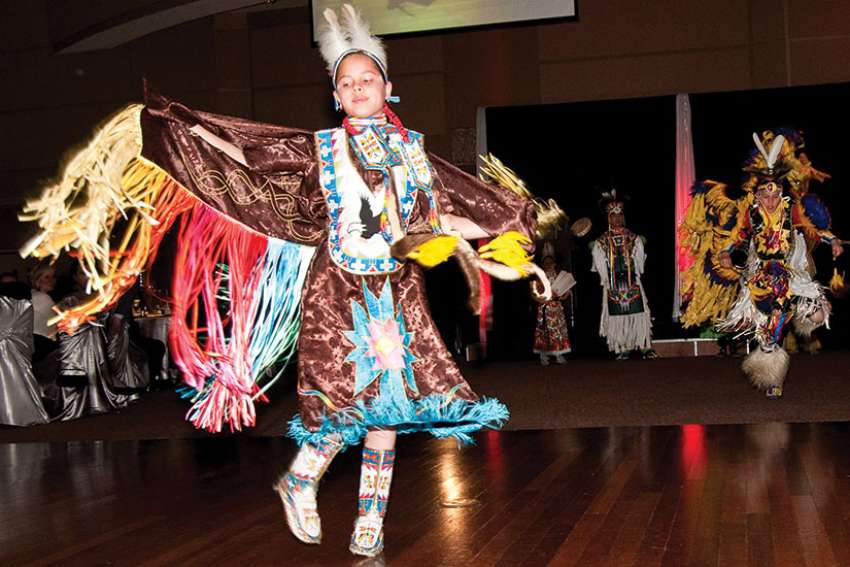She was already serving as a Sister of St. Joseph Sault Ste. Marie for a decade when the teachings of the Second Vatican Council led her to explore the Aboriginal spirituality of her ancestors.
“At the time, I had the sense that in having the Catholic faith I already had everything that I needed and it was only as I began to experience my Indigenous spirituality that I realized that I don’t have everything that I needed,” said Solomon, now 75 and director of the Faith and Justice office for her congregation in North Bay, Ont. Her work is recently focused on Indigenous rights, healing and reconciliation.
Solomon professed her first vows in 1961 at the age of 19. She described her upbringing to be “a very Catholic community, parish and family.” She did not feel a connection to her Ojibway culture at first, but when she began to learn more as a young adult, it completely changed her perspective.
“The deepest values of my own people, as Ojibway people, are values that are totally compatible with the Catholic values,” said Solomon. “It has enabled me to experience wholeness within myself, owning both my Catholic faith and my Indigenous spirituality.”
In 2016, she was a part of a Catholic coalition called Our Lady of Guadalupe Circle. The Circle acted as a consultation committee for two major documents on the Canadian bishops’ response to Truth and Reconciliation Commission’s Calls to Action.
Solomon said that in an era of TRC, the Canadian Church must examine how it ministers to native young people who are rediscovering their own identities as Catholics and as Indigenous.
As Canadian bishops look to engage with young people in a consultation process for the Synod on Young People in October 2018, it is the perfect time to discuss the Church’s role in Aboriginal communities.
“In order to minister to Indigenous youth today, the Church itself has to deepen its awareness and its understanding,” said Solomon. “Not trying to force them back to an old form of Christianity ... but to create opportunities for Indigenous youth to inculturate their faith.”
About 1.4 million Canadians (or 4.3 per cent of the total population) identify as Aboriginal, according to to the 2011 census. Approximately 25 per cent of these peoples also identify as Catholic.
The census also found that the Aboriginal population is much younger than Canada’s non-Aboriginal population. Close to half (46 per cent) of Aboriginal people were under the age of 25, compared to the non-Aboriginal population (30 per cent) in Canada.
“As a society in general, Canadian society is aging ... but with the native community, that’s not the case. They’re a very young community,” said Bishop Peter Hundt of Corner Brook and Labrador.
Hundt said his diocese has two Aboriginal communities: the Natuashish and the Sheshatshiu. The largest religion in both these Innu communities is Catholicism.
Like many Aboriginal communities, the young people face huge challenges in substance abuse, violence and suicide rates.
In 2012, Statistics Canada conducted an Aboriginal Peoples Survey which found the rate of heavy drinking and daily smoking to be significantly higher for Aboriginal youth than their non-Aboriginal counterparts.
A 2006 study shows Aboriginal Canadians aged 15 to 34 are two and a half times more likely to be victims of violence. An average of 25-50 per cent of Aboriginal women were victims of sexual abuse as children compared to 20-25 per cent of non-Aboriginals.
A 2006 study on mental health shows that suicide rates among First Nation young adults (15-24 years) are five to seven times higher than the Canadian average.
In the midst of these sociopolitical challenges, there is a cultural challenge that Hundt said elders are just as concerned about.
“In terms of the older people, I think they would want their children and grandchildren to be more involved with their religion,” said Hundt. “I think that a part of what they struggle with, which isn’t that different from society in general, is the sense of helplessness. They want to pass on the riches of the spiritual life, but the grandchildren are more interested in the iPads and Facebook.”
Hundt and Solomon both agree that youth ministers and school chaplains are key players in ministering to the unique spiritual needs of Aboriginal youth.
“While many do not readily identify with organized religion, they are spiritually attune to the power of prayer and blessings,” said Bishop Mark Hagemoen of Mackenzie- Fort Smith in the Northwest Territories.
Hagemoen said the native communities in his diocese benefit greatly from Catholic mission outreach programs from NET Canada, Catholic Christian Outreach and others. However, these programs are based on shortterm visits and relationships come to an end.


